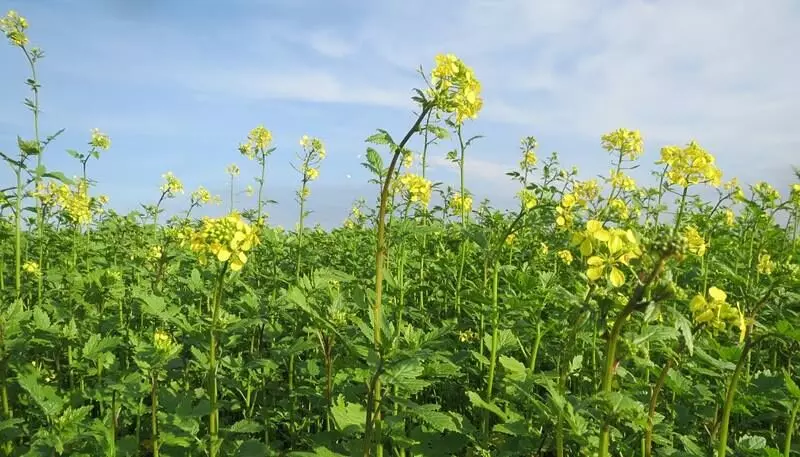On October 18 last month, the Genetic Engineering Appraisal Committee (GEAC), the apex regulatory body for monitoring the release of genetically modified (GM) crops in India, recommended environmental release of genetically modified herbicide tolerant mustard. This decision was conveyed to the crop developer, Delhi University’s The Centre for Genetic Manipulation of Crop Plants, on October 25.
This is the first genetically modified food crop permitted to be released into the open environment in India. There are reports that GM mustard has already been planted in seven places — Delhi, Bharatpur, Ganganagar, Ludhiana, Jhansi, Varanasi and Kanpur — across four states in Delhi, Rajasthan, Punjab and Uttar Pradesh. This approval and planting of GM mustard is in contempt of the orders of the Supreme Court.
In the PIL ( W.P.(C) No. 260/2005) filed by a concerned citizen Aruna Rodrigues & Ors, about GM crops, the Union government had assured the apex court, during the hearings in 2016-17, that the decision to approve GM mustard had not been taken, and if any such decision is taken the government will seek the court’s approval.
After the GEAC’s recent decision, the petitioner moved the court on Nov 3, earlier this month, and the court instructed the government to not take any precipitative action in the matter of GM mustard. The next hearing of the Supreme Court is slated for today, November 29.

The GM mustard being deployed is riddled with problems with regard to its yield claims and the GM technology deployed to create it has also not been adequately tested
Also Read: Explained: Why govt’s move to allow genetically modified food is facing criticism
What is GM mustard?
The genetically modified mustard DMH-11 (Dhara Mustard Hybrid-11) has been developed by Dr Deepak Pental and team at the Centre for Genetic Manipulation of Crop Plants (CGMCP) of the University of Delhi.
The technology is based on artificial insertion of three genes from two strains of bacteria in two parental lines of mustard. Out of those three genes, Bar gene, which is introduced in both parents, attributes herbicide tolerance (against a herbicide called Glufosinate, which is a patented product of Bayer, an agro-chemical and seed giant), Barnase gene induces male sterility in the female parent, and Barstar gene restores male fertility in F1 progeny.
Also Read: Why Zero Budget Natural Farming is important for our farmers?
Problems with GM mustard
The GM mustard being deployed is riddled with problems with regard to its yield claims and the GM technology deployed to create it has also not been adequately tested. The issues have been brought to the notice of the apex regulatory body many times and those have been ignored and go ahead given.
Many tests recommended by the GEAC during its deliberations have been waived in later sittings based on the request of the Dr Deepak Pental and team.
The biosafety dossier has not been made available to the public in an accessible manner. After repeated requests and orders from the Central Information Commissioner, the GEAC has made a physical copy of the biosafety dossier (that runs into thousands of pages) available in its office in New Delhi. Interested citizens can peruse this, however they are not allowed to make copies or take photographs to study it. So no independent verification of the biosafety dossier has been done.
It is the independent review of the biosafety dossier of Bt brinjal in 2009-10 that led to the findings of many critical gaps in the tests undertaken by the developers. That in turn was one of the reasons that led to the moratorium on Bt brinjal by the then Minister for Environment & Forests.
Issued with hybrid mustard
The developers of GM mustard DMH-11 claim that this will lead to a huge jump in the productivity of mustard in the country. However, the reality is that the yield comparison of DMH-11 has been done with Varuna, a 46-year-old open pollinated variety and not the best and highest yielding mustard hybrids already available to farmers. In fact, releasing a comparatively low yielding DMH-11 could lead to a decrease in yield.
Indian mustard, technically known as Brassica juncea, does not respond well to hybridization compared to maize, pearl millet or castor due to the limitations of its genetic make-up. However, both the public and private sectors have developed many hybrids without GM technology and all these yield better than this transgenic hybrid mustard.
It is being claimed that GM mustard DMH-11 will lead to reduction in import of edible oil into the country. The reality is that the country is almost self-sufficient in mustard oil. Increase in mustard oil production (as claimed) is not going to lead to increase in mustard oil consumption as edible oils are culture and cuisine specific and the country consumes about eight different edible oils. Edible oil imports into the country pertain mainly to cheap palm and soybean oil, which has increased since the import duty was made zero.
Even after releasing more than 40 high yielding varieties and hybrids of mustard in the last decade the edible oil import has jumped up proving that the introduction of one new hybrid of one oil seed is hardly the solution.
GM mustard DMH-11 is a herbicide tolerant GM crop. This means that the GM mustard crop can be blanket sprayed with the herbicide glufosinate to deal with weeds.
World over, the blanket spraying of herbicides over GM Ht crops is coming under intense scrutiny due to the deleterious impact on crop ecosystems, water resources and the health of farmers and consumers.

Indian mustard, technically known as Brassica juncea, does not respond well to hybridization compared to maize, pearl millet or castor due to the limitations of its genetic make-up.
The GEAC has addressed this glaring issue in its GM mustard note, which reads, “Usage of any formulation of herbicide is not permitted for cultivation in the farmer’s field under any situation and such use would require the necessary permission as per the procedures and protocols of safety assessment of insecticides/ herbicides by CIB & RC.”
And that use of this herbicide in the farmers fields would attract legal action.
This is a specious statement as we have thousands of acres of herbicide tolerant GM cotton being grown illegally with no action taken by the regulator despite evidence presented to them time and again. We have no effective machinery to monitor or take action.
Also Read: Rural population faces a pinch with the sharp rise in edible oil prices and food inflation
In the past, illegal cultivation of Bt cotton was also completely ignored by the apex regulator. In addition, it’s a known fact that use of agro-chemicals in the fields in India is hardly regulated by anybody and indiscriminate use is the norm rather than the exception.
India is the centre of diversity for mustard. One of the recommendations of the Technical Expert Committee (TEC), appointed by the Supreme Court on the issue of GM crops in India, is to stop GM research for all crops where India is the centre of origin or diversity.
This is because containment is impossible and contamination is inevitable on the fields. Ironically, this has been the very strategy adopted by GM seed companies in the past to spread Bt cotton. This is currently happening with herbicide tolerant BT cotton.
Mustard is an important crop for honey bees, where bees are the main pollinators of mustard resulting in higher yields of mustard if there are abundant bees. On the other hand, honey is an economically important by-product in mustard growing areas due to the abundance of honey bees around mustard crops.
It has been found in research settings and under field conditions that the presence of GM crops changes the ecosystem conditions making GM crop fields a less hospitable space for honey bees resulting in lower honey production and lower pollination of the crops.
Also, the change in the biochemical composition in the plants due to genetic modification as well as spraying of the herbicide could have unintended impacts on the honey bee’s health.
These and many more pertinent issues are unaddressed with this GM mustard and there is no need to deploy this unnecessary GM crop, which is not required in the first place.
Coimbatore-based Sreedevi Lakshmi Kutty is a steering group member of the Alliance for Sustainable & Holistic Agriculture (ASHA). She is also the co-founder of Bio Basics, which curates and markets organically grown grains and other foods. Views are personal.


















